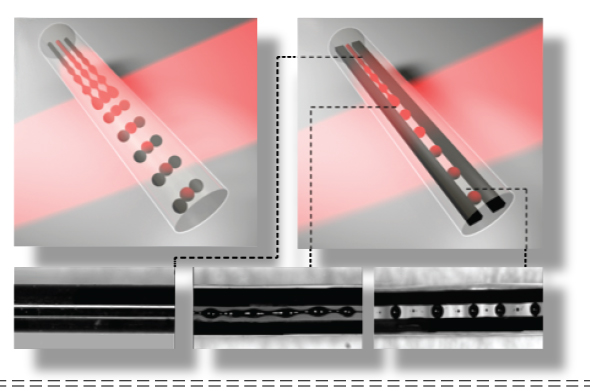
The Materials Science and Engineering Center at MIT funds three different levels of research:
- Interdisciplinary Research Groups (IRGs)
- Initiative Projects
- Seed Projects
Highlights of IRG research are reported on an on-going basis to the NSF MRSEC program.
INTERDISCIPLINARY RESEARCH GROUP (IRGs)
IRGs are composed of MIT faculty who, with their students and postdoctoral associates, investigate fundamental scientific questions and pathways to reach significant technological goals that can only be properly explored in a collaborative, multidisciplinary mode. These problems are too large in scope to be addressed by individual faculty members and their students. The research goals and accomplishments are reviewed regularly so that appropriate adjustments can be made to insure the quality of the Center's research effort.
IRG-I: Harnessing In-Fiber Fluid Instabilities for Scalable and Universal Multidimensional Nanosphere Design, Manufacturing, and Applications
IRG-II: Simple Engineered Biological Motifs for Complex Hydrogel Function
IRG-III: Nanoionics at the Interface: Charge, Phonon, and Spin Transport
INITIATIVE PROJECTS
The purpose of Initiative funding is to incubate and develop a nascent interdisciplinary group that has the potential to become a future IRG. Typically, an initiative comprises three or four faculty members sharing a common vision for a newly emerging area of research.
The MIT MRSEC is not conducting Initiative research at this time.
SEED PROJECTS
The primary goal of seed funding is to support research that has the potential to redefine the direction of an existing IRG or to lead to the creation of a completely new IRG. The fresh direction may be motivated by a newly appreciated opportunity for scientific discovery or by a specific issue of technological relevance. Strong preference is given to junior and new faculty members to draw them into collaborative interdisciplinary research.
The following is a list of current Seed Projects that were our recent competition winners:
Seed-I: Thin Film Chromium Oxide Perovskites
Riccardo Comin, Assistant Professor, Department of Physics
Seed-II: Synthesis and Study on the Spin-Charge Interaction in Topological Semimetal/Ferromagnet Heterostructures
PI: Luqiao Liu, Assistant Professor, Department of Electrical Engineering and Computer Science
Seed-III: Bottlebrush Hydrogels as Tunable Tissue Engineering Scaffolds
PI: Robert Macfarlane, Assistant Professor, Department of Materials Science and Engineering
Seed-IV: A Lithium Solid-State Memristor - Modulating Interfaces and Defects for Novel Li-Ionic Operated Memory and Computing Architectures
PI: Jennifer L.M. Rupp, Assistant Professor, Department of Materials Science and Engineering
The following is a list of former Seed Projects:
Seed-I: Chemically Modified Carbon Cathodes of High Capacity Li-O2 Batteries
PI: Yogesh Surendranath, Assistant Professor, Chemistry
Seed-II: Interface Engineering of Silicon-Oxide Core-Shell Nanorods for High-Efficiency Water Splitting Photocatalysts
PI: Alexie M. Kolpak, Assistant Professor, Mechanical Engineering
Seed-III: Single Crystal Study of Electronic Topology and Correlation
PI: Joe Checkelsky, Assistant Professor, Physics
Seed-IV: Direct Deposition of Catalysts on Porous Metallic Foams for Efficient CO2 Electroreduction
PI: Fikile R. Brushett, Assistant Professor, Chemical Engineering
SuperSeed: Magnetically and Optically Driven Topological Semimetals
PI: Liang Fu, Nuh Gedik, Joseph Checkelsky
